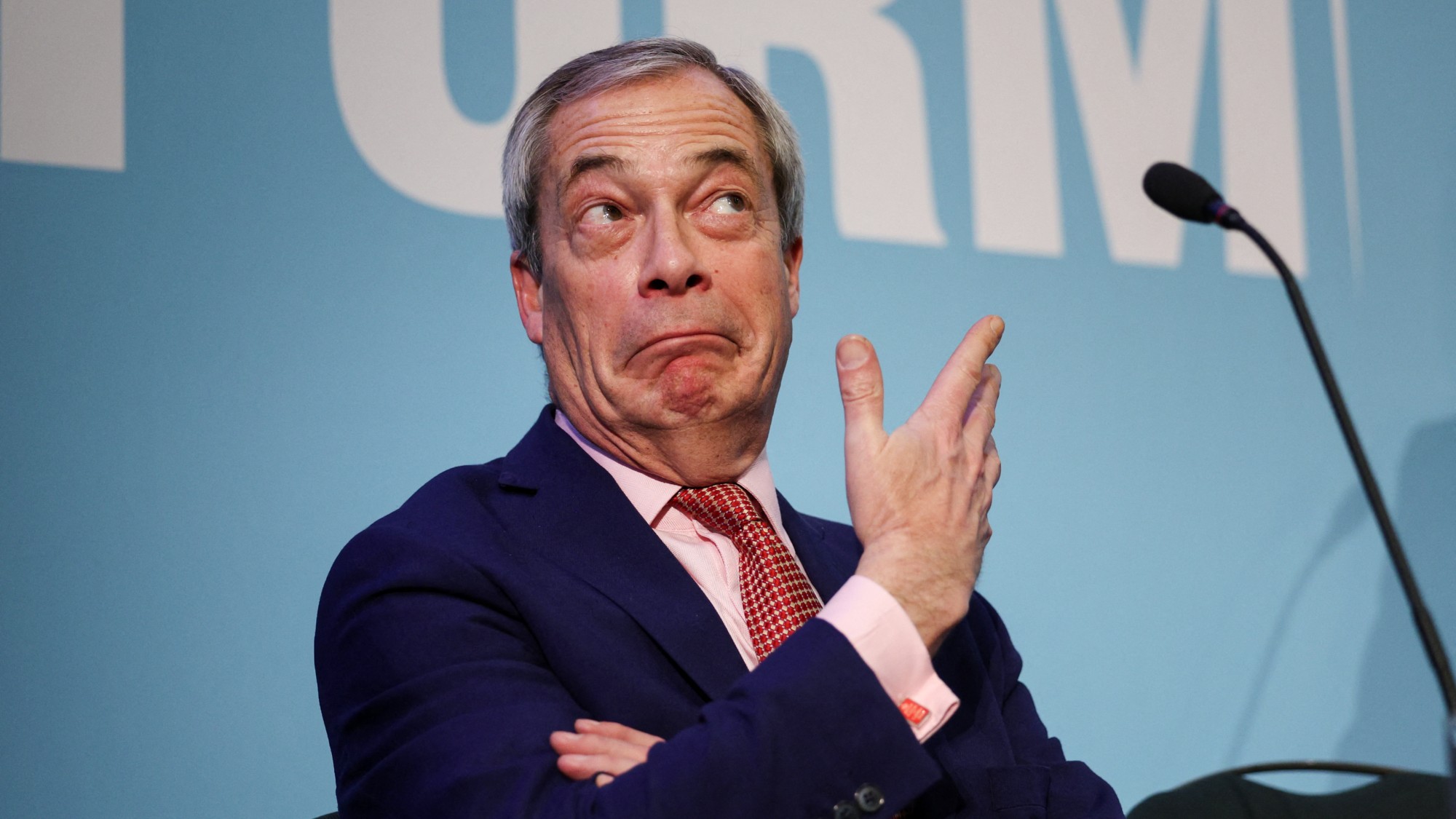Would a Tory-Reform UK pact be a winner for both sides?
Does a deal between the two parties benefit either, both – or neither?

A free daily email with the biggest news stories of the day – and the best features from TheWeek.com
You are now subscribed
Your newsletter sign-up was successful
"It's time to give the people what they want: a Tory-Reform, non-aggression pact," said Jacob Rees-Mogg on GB News, arguing that Labour won its majority because the right-leaning vote was split between Reform and his party, the Conservatives.
It's simple logic in the context of a recent YouGov poll of almost 2,500 UK adults on how people would vote were a general election to be held tomorrow: 25% for Reform UK, 24% for Labour and 21% for the Conservatives. But Rees-Mogg's strongest argument in favour of an electoral pact is that the poll revealed one in five of those who voted Tory in the last general election would now vote for Nigel Farage's Reform UK party.
'Nigel Farage wants to destroy the Conservative party'
Even Tory leader Kemi Badenoch has admitted that Reform is likely to triumph at the Runcorn by-election next month but she has ruled out a "national level" deal with Reform because "Nigel Farage has said that he wants to destroy the Conservative Party". A number of her MPs told The i Paper that an informal non-competition agreement would "make a lot of sense", and Badenoch told BBC Breakfast that Tory councillors would have to "make the choice about what is right for their councils" after the elections. In an attempt to defuse the issue, she pointed out that Tories were already governing locally as part of "various coalitions" with other parties, including Labour and the Lib Dems.
The Week
Escape your echo chamber. Get the facts behind the news, plus analysis from multiple perspectives.

Sign up for The Week's Free Newsletters
From our morning news briefing to a weekly Good News Newsletter, get the best of The Week delivered directly to your inbox.
From our morning news briefing to a weekly Good News Newsletter, get the best of The Week delivered directly to your inbox.
But any kind of local level pact might not be the win for Reform that it first appears. The insurgent party is "thus far untainted by the realities of power", said UnHerd's Tom Jones. "Getting into government, even if limited to the local level, may dull the insurgent edge on which the party trades".
'Drifting further to the right'
But cosying up to Reform won't save Badenoch's party either, said Bloomberg columnist Rosa Prince. The Tories should realise that they're always better off occupying the centre ground rather than continuing a "half-hearted attempt to restore the party's fortunes by drifting further to the right". Instead of mimicking Reform's populist policies as her internal leadership rival Robert Jenrick is wont to do, Badenoch should challenge Labour on the economy and particularly taxation.
The combination of a gloomy economic outlook, not helped by Trump's trade wars, and Labour's lack of connection with voters gives the Tories an opportunity to appeal to voters who care less about "irrelevant woke wars" than about "their own personal finances". And Badenoch should remember that Farage's character is off-putting to as many centrists as it is attractive to those who have defected to Reform.
Speaking of defectors, Conservative-MP-turned-Reform-candidate Andrea Jenkyns is running for mayor of Greater Lincolnshire in one of the more closely watched contests of the local elections coming up on 1 May. If Jenkyns wins, the Tory party is braced for further defections and a "renewed frenzy over a potential deal or even merger", said Rachel Cunliffe in The New Statesman. But if Jenkyns loses, Reform's momentum may falter. "The party has poured everything it has into Lincolnshire. If it can't win here, doubts will emerge over how solid its polling figures really are."
A free daily email with the biggest news stories of the day – and the best features from TheWeek.com
-
 The Week contest: AI bellyaching
The Week contest: AI bellyachingPuzzles and Quizzes
-
 Political cartoons for February 18
Political cartoons for February 18Cartoons Wednesday’s political cartoons include the DOW, human replacement, and more
-
 The best music tours to book in 2026
The best music tours to book in 2026The Week Recommends Must-see live shows to catch this year from Lily Allen to Florence + The Machine
-
 The Mandelson files: Labour Svengali’s parting gift to Starmer
The Mandelson files: Labour Svengali’s parting gift to StarmerThe Explainer Texts and emails about Mandelson’s appointment as US ambassador could fuel biggest political scandal ‘for a generation’
-
 Three consequences from the Jenrick defection
Three consequences from the Jenrick defectionThe Explainer Both Kemi Badenoch and Nigel Farage may claim victory, but Jenrick’s move has ‘all-but ended the chances of any deal to unite the British right’
-
 The high street: Britain’s next political battleground?
The high street: Britain’s next political battleground?In the Spotlight Mass closure of shops and influx of organised crime are fuelling voter anger, and offer an opening for Reform UK
-
 The MAGA civil war takes center stage at the Turning Point USA conference
The MAGA civil war takes center stage at the Turning Point USA conferenceIN THE SPOTLIGHT ‘Americafest 2025’ was a who’s who of right-wing heavyweights eager to settle scores and lay claim to the future of MAGA
-
 How cryptocurrency is changing politics
How cryptocurrency is changing politicsIn The Spotlight From electoral campaigns to government investments, crypto is everywhere and looks like it’s here to stay
-
 Nigel Farage’s £9mn windfall: will it smooth his path to power?
Nigel Farage’s £9mn windfall: will it smooth his path to power?In Depth The record donation has come amidst rumours of collaboration with the Conservatives and allegations of racism in Farage's school days
-
 ECHR: is Europe about to break with convention?
ECHR: is Europe about to break with convention?Today's Big Question European leaders to look at updating the 75-year-old treaty to help tackle the continent’s migrant wave
-
 Is a Reform-Tory pact becoming more likely?
Is a Reform-Tory pact becoming more likely?Today’s Big Question Nigel Farage’s party is ahead in the polls but still falls well short of a Commons majority, while Conservatives are still losing MPs to Reform